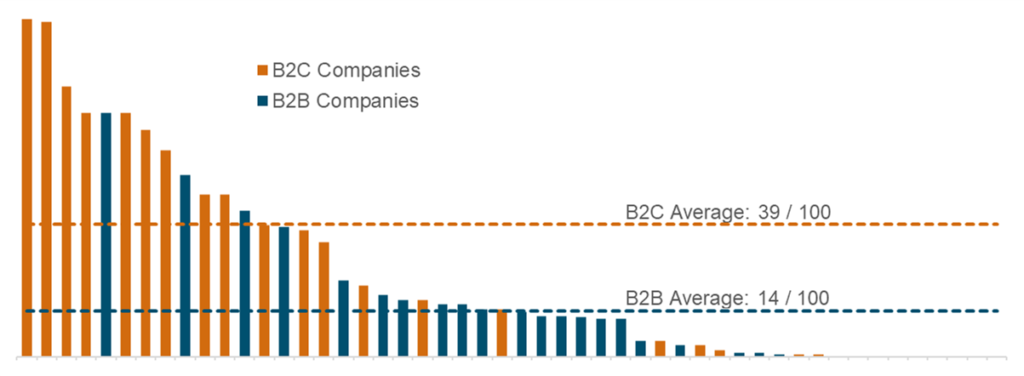
Are B2B companies capturing the value of digital?
Many B2B companies are coming to realise that digital, rather than a cost or just for B2C, can capture major benefits and efficiencies for businesses and their customers, and unlock significant value creation.
As consumers, our expectations of good interactions are being driven by modern digital services that bypass the need for traditional assets and distribution. Taxi companies are competing with Uber, TV broadcasters with Netflix, banks with neobanks, hotels with AirBnB. These companies invest heavily in digital, including the user experience, intelligent algorithms and personalisation, because that’s the core of how they win and retain customers. Unfortunately for the rest of the business world which has physical assets, operating environments and legacy systems to grapple with, they are setting the customer expectations by which we all judge our interactions with businesses.
Many traditional B2C companies have realised this over the last 5-10 years, and invested in digital to stay relevant and continue to compete. However, our observation is that many B2B companies are falling behind. A review of the ASX Top 50 shows a clear distinction between how much strategic focus B2C and B2B companies are placing on digital.
ASX Top 50 Digital Focus Index

Source: Mainsheet Capital analysis based on FY19 annual reports. Index is based on digital as a strategic focus, accountability for digital and investment in digital.
To illustrate, a construction manager can know exactly how far away his or her Uber is, but have no idea whether a $100,000 delivery of building materials will arrive on time. Uber has identified and captured an economic benefit – greater utilisation of drivers’ vehicles, and a streamlined ride experience for consumers which improves certainty and requires less cognitive effort. The building materials supplier in our example, however, has not yet realised what digital can do.
The economic imperative for businesses to adopt digital has been more obvious in B2C. Consumers represent a much greater volume of interactions, and much less value per individual customer. But while B2B is different to B2C when it comes to digital strategy, the impact of digital can be just as transformational. It involves not only web and apps, but impacts right across the business from the customer experience and integrated supply chains, to process automation and decision analytics.
Mainsheet has worked with a number of large service and product organisations to assist in capturing the value of digital. We developed the strategy and investment case with one of our clients to revolutionise the property sales process in Australia with a 100% digital process. We assisted another client to build an offering around connected smart sensors and cloud-based analytics, which has enabled its customers to avoid tens of millions of dollars in capex, simply by having better information on the operational performance of its assets. Not only has this created a substantial new revenue stream, it also means that our client has strategic relationships with its customers due to its valuable data and insight.
In our experience there are many tangible examples across industries where digital transformation represents not a cost impost but an economic opportunity, such as:
- Enabling supply chain visibility so that stakeholders and customers can optimise asset and labour utilisation
- Using technology to trace individual products back to their source to verify their integrity, authenticity and ownership
- Streamlining order management to remove effort from customers and improve forecasting and stock availability
- Using asset analytics to drive the operational efficiency of key physical assets and enable predictive maintenance
- Using data to manage end-to-end logistics and fleet efficiency in real-time
- Servicing micro segments and high-value customers whilst optimising production efficiency
We find it helpful to consider some of these questions to prompt whether digital transformation could unlock value creation in your business:
- Would customers benefit from having greater access to information and/or more real-time information?
- Do customers use a smartphone as part of their day to day business interactions?
- Are customers making visits or calls that could be handled digitally?
- Would more integrated ordering and supply management lead to more sales and/or greater efficiency?
- Would it be powerful to be able to make operational decisions more quickly and based on data?
If the answer to some of these questions is yes, there is likely to be a compelling case for a company to re-evaluate its digital transformation strategy. It could be missing substantial revenue and/or cost opportunities and risk being left behind by customer expectations!
If you would like to know more about how Mainsheet has assisted other companies to create value through digital transformation, or would like to discuss the digital challenges you face, please get in touch with us here.
